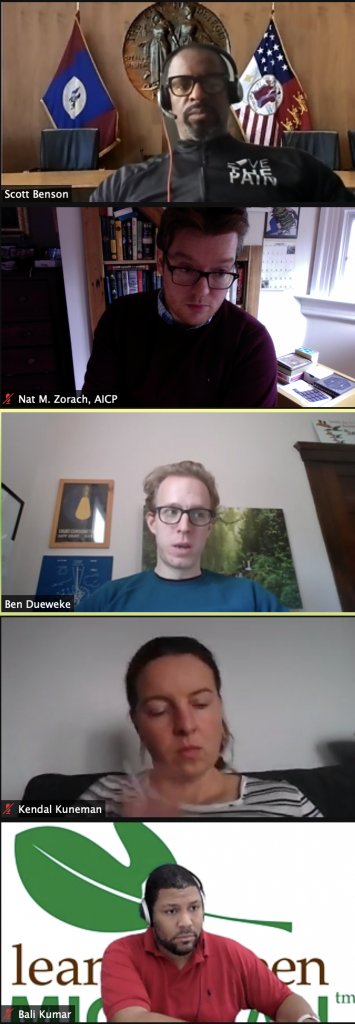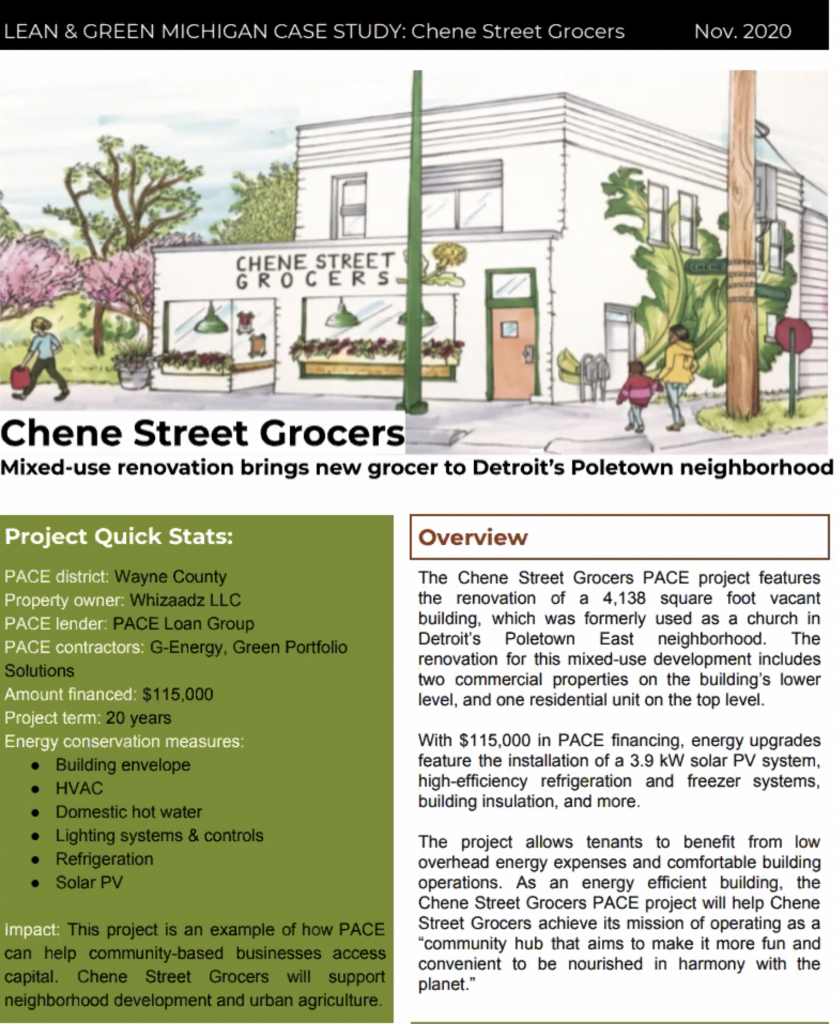Detroit’s Green Task Force Looks Toward Benchmarking, PACE, Energy Codes
The Energy Waste Reduction Committee of the Detroit Green Task Force met yesterday morning to talk shop for the last time in 2020, and the volunteer work group is looking forward to some ambitious new developments in 2021. The volunteer committee, organized by an authorization from Detroit Councilmember Scott Benson (District 3, a.k.a. the great northeast), meets on the second Tuesday of each month to discuss Detroit-specific policy and implementation around sustainability and energy conservation.
The meeting kicked off with a presentation from Detroit’s own EcoWorks about the Youth Energy Squad. The program enlists students at Detroit Public Schools to become advocates for sustainability, covering everything from nutrition to energy and water conservation. Latia Leonard, Michal Helman, and Josh Musicant presented.
PACE, The Final Frontier– of financing?
Bali Kumar and Elise Matz of Lean & Green Michigan presented on the company’s latest project using Property-Assessed Clean Energy, or PACE, financing. Lean & Green Michigan was founded by now-Congressman Andy Levin as Levin Energy Partners. Levin divested from the company when he went to Washington (apparently some people are more attentive to that whole “conflicts of interest involving the family business than others”), and it rebranded as Lean & Green.
PACE is a relatively new financing mechanism that allows property owners to finance energy and sustainability improvements through future savings– attached to property taxes. It’s authorized by federal law and adopted by individual states– and counties within them. While a bit more operationally cumbersome than, say, putting the improvements on a credit card, it’s a far more affordable way to finance especially larger improvements. Like on-bill financing, PACE falls under the category of things that are clever, effective, and valuable, but have struggled to find widespread adoption.
Check out the video!

Sustainable transformation through regulatory innovation
The private sector is often the best at organizing capital and facilitating quick development of products or solutions. But the government is able to take those solutions and scale them by incorporating them into policy frameworks. The “carrot-and-stick” approach refers to the ability of regulators to variously incentivize favorable outcomes or penalize unfavorable ones. PACE is a great example in a bigger-picture sense.
At a smaller, more local level, municipal government is a key stakeholder. The task force is pushing for adoption of an energy benchmarking ordinance. The idea is that by requiring building owners to track and record their energy usage, they set a baseline for future energy usage. Most research shows that this alone creates a behavioral incentive for energy conservation. New York adopted a benchmarking policy beginning partially in 2010, and Chicago adopted a benchmarking ordinance in 2013. That Detroit is a bit behind the times is no surprise given the fiscal state of the city and the legacy of conservatism in the Mitten State. But it’s also a tough sell given the massive public relations challenge of pushing something that detractors might accuse of being “anti-development” in a shrinking city eager to attract new investment.
Detroit’s 2030 District is a key advocate in this fight. The major problem, then, is getting managerial buy-in, which came up in the GTF discussion. BSEED, the city building department, in particular is a challenging, but vital target. One BSEED manager, who shall remain nameless, once told me in no uncertain terms that “all that green building crap” isn’t “real” construction.

…which first requires a challenging transformation of mindset
One supposes this isn’t a terribly surprising attitude given the entrenched orthodoxy of the construction trade at large. There’s still an unfortunate mentality of “I was trained this way, my father was trained this way, and we won’t change.” There’s also (still, at least in Michigan) a stereotype of energy conservation as being in the “beads-and-sandals” realm (remember when Donald Trump ranted about how LED lights were killing us? Or Laura Ingraham’s steak+lightbulb stunt?). In this vein, another BSEED supervisor once lamented to me privately that “men aren’t men anymore,” making it harder for him to do his job. We’re not men, because we’re too busy trying to save what’s left of the planet!
But, seriously. BSEED could be a crucial partner in facilitating widespread adoption of energy standards, sustainability, and benchmarking. The department quite literally touches every single parcel or building in the entire city. As such, it has the ability to work with property owners both based on regulatory enforcement (“stick”) and incentives (“carrot”) to implement energy and sustainability measures. Envelope retrofit financing? Absolutely. Mechanical and hot water replacement? Definitely. Green stormwater improvements? No doubt. All possible– with the right managerial buy-in. Culture, leadership, and a belief in innovation, unlike Reaganomics, are indeed “trickle-down” things within organizations. Of course, a good start would be to start enforcing IECC, which BSEED does not currently do.

Other Stuff Going On
Normally, this time of year, I’d be hitting the holiday party circuits (which are increasingly a who’s who of everyone who’s ever turned me down for a job). This year, everything has gone virtual, and it’s creating some weird but also kind of awesome opportunities. My partner’s employer, a nationwide company, is saving so much money from not hosting the in-person Christmas party, that they’ve sent everyone a whole smoked turkey (or non-meat feast of their choice). POCACITO, or the Post-Carbon Cities of Tomorrow, a transatlantic professional program of the Ecologic Institute that has received support from the European Union, is hosting an event this Friday, December 12th, on Growing, Feeding, and Building Community. The Michigan Public Service Commission is requesting comment on an Energy Waste Reduction / Demand Response study. Comments should be sent to michigan.energystudy@guidehouse.com.
We also heard that the city’s sustainability office, under the leadership of Joel Howrani-Heeres, has been downsized and subumed into the city’s General Services Department. This is perhaps disappointing. But it’s not surprising within a mayoral administration that has struggled to coalesce around a progressive policy platform amid freefalling public revenues from COVID, ongoing protests and litigation around police brutality, and an exodus of top talent. The key is for us to make sure going into 2021 that we remain focused on the important policy initiatives, and to hold accountable the people who should be getting them produced. Recovering from COVID is not going to be easy, and the case for doing it sustainably is utterly critical– to save money for cities and consumers alike, and to ensure that we have a bright, post-COVID future to look forward to.
Stay tuned for the latest developments, and the task force will see you all in 2021! Plenty of more content coming from us between now and then.
Check out Lean and Green Michigan, EcoWorks, and Detroit’s 2030 District. The views reflected in this piece are the author’s alone and do not reflect those of the Detroit Green Task Force or its Energy Waste Reduction Committee.




